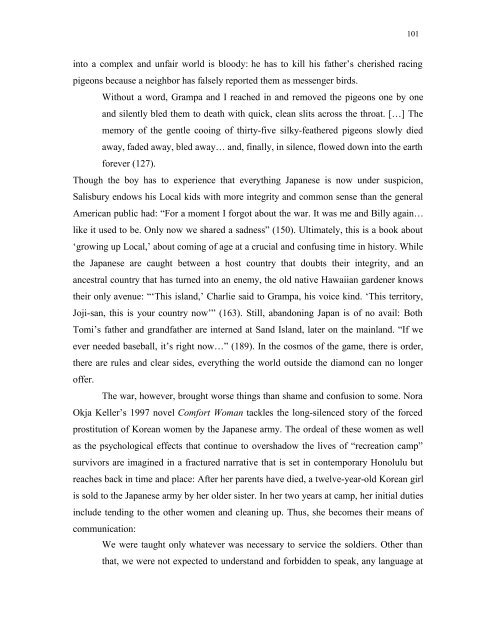A Paradise Lost - KOPS - Universität Konstanz
A Paradise Lost - KOPS - Universität Konstanz
A Paradise Lost - KOPS - Universität Konstanz
Create successful ePaper yourself
Turn your PDF publications into a flip-book with our unique Google optimized e-Paper software.
into a complex and unfair world is bloody: he has to kill his father’s cherished racing<br />
pigeons because a neighbor has falsely reported them as messenger birds.<br />
Without a word, Grampa and I reached in and removed the pigeons one by one<br />
and silently bled them to death with quick, clean slits across the throat. […] The<br />
memory of the gentle cooing of thirty-five silky-feathered pigeons slowly died<br />
away, faded away, bled away… and, finally, in silence, flowed down into the earth<br />
forever (127).<br />
Though the boy has to experience that everything Japanese is now under suspicion,<br />
Salisbury endows his Local kids with more integrity and common sense than the general<br />
American public had: “For a moment I forgot about the war. It was me and Billy again…<br />
like it used to be. Only now we shared a sadness” (150). Ultimately, this is a book about<br />
‘growing up Local,’ about coming of age at a crucial and confusing time in history. While<br />
the Japanese are caught between a host country that doubts their integrity, and an<br />
ancestral country that has turned into an enemy, the old native Hawaiian gardener knows<br />
their only avenue: “‘This island,’ Charlie said to Grampa, his voice kind. ‘This territory,<br />
Joji-san, this is your country now’” (163). Still, abandoning Japan is of no avail: Both<br />
Tomi’s father and grandfather are interned at Sand Island, later on the mainland. “If we<br />
ever needed baseball, it’s right now…” (189). In the cosmos of the game, there is order,<br />
there are rules and clear sides, everything the world outside the diamond can no longer<br />
offer.<br />
The war, however, brought worse things than shame and confusion to some. Nora<br />
Okja Keller’s 1997 novel Comfort Woman tackles the long-silenced story of the forced<br />
prostitution of Korean women by the Japanese army. The ordeal of these women as well<br />
as the psychological effects that continue to overshadow the lives of “recreation camp”<br />
survivors are imagined in a fractured narrative that is set in contemporary Honolulu but<br />
reaches back in time and place: After her parents have died, a twelve-year-old Korean girl<br />
is sold to the Japanese army by her older sister. In her two years at camp, her initial duties<br />
include tending to the other women and cleaning up. Thus, she becomes their means of<br />
communication:<br />
We were taught only whatever was necessary to service the soldiers. Other than<br />
that, we were not expected to understand and forbidden to speak, any language at<br />
101

















